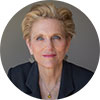Download PDF

Who is your hero?” This was a question commonly posed by interviewers when I was applying to medical school—and I hated it. I admired many people, but I’m not sure I could call them “my heroes.” Besides, it was impossible to pick just one person. Mentoring is similar because many people shape our careers. They may mentor us formally, through their teaching, or informally, by modeling what it means to be a physician. And perhaps the informal mentoring is the more effective.
I once commented to Susan Day, then ophthalmology chair at California Pacific Medical Center, that the character of a person is set by the time he or she shows up as a resident. She vigorously disagreed, saying, “Residency is a pivotal time for shaping a person.” I now know that ophthalmologists continue to grow and change as we work together and influence one another.
Much of the mentoring that occurs during residency and fellowship is highly structured. Our teachers pass on clinical knowledge, surgical technique, examination skills, and professional advice. But we learn the most about becoming a physician informally, simply by spending so much time with our teachers. Fellowship training is one of the most intense mentoring experiences ever. What a privilege to spend a year or two with a few ophthalmologists who try to pass on everything they know! Pithy—and probably offhand—comments from one of my fellowship directors, Dunbar Hoskins Jr., still ping around in my head 25 years later.
The most important mentors may not even know that they are mentoring. I met Emily Chew when I was in my first year in practice. She’s the deputy director of the division of epidemiology and clinical applications at the National Eye Institute and director of the medical retina fellowship at NEI. I didn’t know her well, but I observed a woman participating in important clinical trials (EDTRS, AREDS, and AREDS2), working at the NEI while raising 3 fabulous kids. Because I saw Emily managing a great career and a family, I knew that I could, too. I never even asked her about it.
My aunt Lois, who died a decade ago, mentors me still because I remember her so clearly. A college president and later chancellor of 3 California state colleges, she worked cooperatively in the male-dominated world of the 1970s and 1980s. She didn’t talk much about herself, but I watched her lead a college board and several administrations. I once called her from a pay phone with trembling hands when I thought a colleague was treating me unfairly. She calmly told me that I had to be clear about what I wanted and then negotiate for it. I never forgot those words.
At this stage of life, I can settle on a hero: Ernest Shackleton, the early-20th-century Antarctic explorer. Even though his best-known expedition failed, I’ve learned from his story. When his beautiful ship, Endurance, was crushed and sank among the ice floes, the crew had to escape in open lifeboats, facing extreme conditions. Shackleton spent the next 16 months rescuing them, and his entire crew survived. He valued the life of every person on his team and was relentless in his commitment to his colleagues. Shackleton is my informal mentor.
At last year’s Young Ophthalmologists Symposium, I shared some tips for choosing a good job. Having respect for the ophthalmologists in the practice is one of the most important considerations. After all, most weeks we spend more time in the workplace than we do at home with our families. A new physician is informally mentored into the culture of the group. And it doesn’t stop there. I practice in a group with 29 ophthalmologists, and every partner contributes to my professional and personal growth. I am a better person and a better ophthalmologist by interacting all day with such fine physicians who are also fine people.
Ophthalmologists feel a profound satisfaction in passing on their knowledge and wisdom, helping to shape the next generation of physicians. Beyond that, each of us continues to develop throughout our careers. And the most powerful mentoring occurs informally, when we aren’t even noticing.